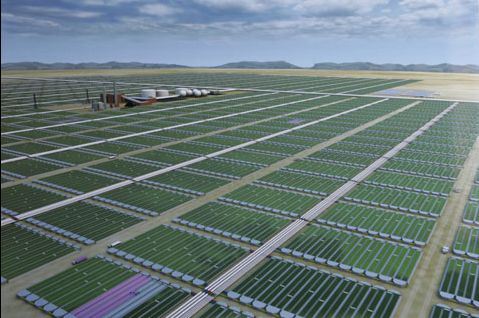Algae Energy : That Other Biofuel
(Special Report) - The biofuel industry, pushed by the Bush Administration as an environmentally friendly alternative has come under a lot of c-r-i-t-i-c-i-s-m lately.
But these criticisms have mostly centered on biofuels that use corn, soybeans, or sugar cane as sources. What about other sources of biofuels?
Using tires, agricultural waste, or switchgrass has been widely discussed, but a new source is entering the conversation: algae.
How efficient is algae biofuel?
Algae energy is low cost/high yield. Algae produces 30 times more energy per acre than other sources of biofuels like soybeans [1]. The reason? Algae has a simple cellular structure, a lipid-rich composition and a rapid reproduction rate. Also, algae can grow in salt water and other harsh conditions, while corn or soybean ethanol requires fertile land and fresh water (100 times the amount of fresh water algae needs).
Algae, like corn and soybeans, is photosynthetic, meaning it absorbs carbon dioxide. And because algae can survive such harsh conditions, some have proposed putting the stuff in smokestacks to absorb released CO2. One other place algae could be grown is in sewage ponds; in fact, it’s already being done in New Zealand.
Another added bonus: if you replaced all of the diesel in the United States with soy biodiesel, it would take half the land mass of the United States. In contrast, if algae fuel replaced all the petroleum used in the United States, it would only require an area about the size of Maryland. [2]
What’s the catch?
Yes, this is definitely not a catch free technology. There are two strong criticisms of “oilgae” (as it is sometimes called):
Although biofuels from algae grown in smokestacks reduce emissions at the factory, the CO2 is just emitted when it is burned in an automobile. There is still a net benefit, as carbon dioxide is only emitted once, instead of twice.
The second problem is potentially more serious. Ideally, algae biodiesel would be used as a transition technology; the problem is, what’s the incentive to develop solar or wind technology when current power plants can be cleaner (but not completely clean) for far less?
Conclusion
Oilgae is an incredibly efficient biodiesel. Nonetheless, there are serious drawbacks, and it would be harmful to overestimate the greenness of this up and coming technology.
[1] http://tinyurl.com/2wnxxa (Washington Post)
[2] http://tinyurl.com/2ldnpn (Wikipedia)





 AIM (bSimmons666)
AIM (bSimmons666) del.icio.us
del.icio.us Digg
Digg MyBlogLog
MyBlogLog Netscape
Netscape StumbleUpon
StumbleUpon Technorati
Technorati









1 comments:
Great Great post. Your'e describing the situation to the point without playing around. How do you know so much of biofuel? Do you work in that field? If so, I have a question for you.
Post a Comment